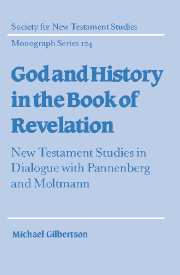 God and History in the Book of Revelation
God and History in the Book of Revelation Book contents
- Frontmatter
- Contents
- Preface
- Acknowledgements
- List of abbreviations
- 1 Setting the scene: a modern debate about faith and history
- 2 Relating scripture and systematic theology: some preliminary issues
- 3 Ways of approaching the Book of Revelation
- 4 The spatial dimension of the Book of Revelation
- 5 The temporal dimension of the Book of Revelation
- 6 Pannenberg, Moltmann, and the Book of Revelation
- 7 Conclusions
- Bibliography
- Index of passages cited
- Index of modern authors
- Index of subjects
1 - Setting the scene: a modern debate about faith and history
Published online by Cambridge University Press: 22 September 2009
- Frontmatter
- Contents
- Preface
- Acknowledgements
- List of abbreviations
- 1 Setting the scene: a modern debate about faith and history
- 2 Relating scripture and systematic theology: some preliminary issues
- 3 Ways of approaching the Book of Revelation
- 4 The spatial dimension of the Book of Revelation
- 5 The temporal dimension of the Book of Revelation
- 6 Pannenberg, Moltmann, and the Book of Revelation
- 7 Conclusions
- Bibliography
- Index of passages cited
- Index of modern authors
- Index of subjects
Summary
Introduction
The starting point for this study lies in twentieth-century debates about the relationship between history and faith. These debates are one of the most enduring features of the modern theological scene. As far as New Testament studies are concerned, the debates have most often arisen in the context of the application of the historical-critical method to scripture. The two most obvious examples of this have been the various ‘quests’ for the historical Jesus, and the continuing discussions about the extent to which the resurrection of Jesus is accessible to the historical-critical method.
However, this study is concerned with a rather different question, which relates not so much to the exercise of the historical-critical method, but rather to some of the underlying assumptions made about the nature and significance of history as such. This more fundamental question is about the relationship between divine reality and the world of historical events. Of course, this question cannot be isolated from issues relating to the application of historical criticism to the biblical record. Three of the main protagonists to whom I refer in this opening chapter – Troeltsch, Bultmann and Pannenberg – have engaged in great depth with both sets of questions, and a major point of Pannenberg's programme is precisely the illegitimacy of dividing the two sets of questions from each other. Nonetheless, the focus in this study will be especially on the debate about the significance of history per se.
- Type
- Chapter
- Information
- God and History in the Book of RevelationNew Testament Studies in Dialogue with Pannenberg and Moltmann, pp. 1 - 19Publisher: Cambridge University PressPrint publication year: 2003


